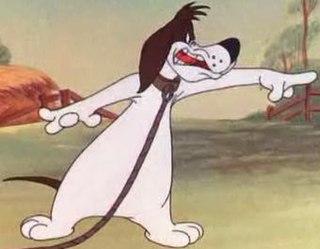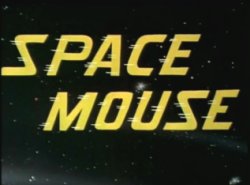
The golden age of American animation was a period that began with the popularization of sound synchronized cartoons in 1928 and gradually ended in the 1960s when theatrical animated shorts started to lose popularity to the newer medium of television. Animated media from after the golden age, especially on television, were produced on cheaper budgets and with more limited techniques between the late 1950s and 1980s.

Walter Lantz Productions was an American animation studio that was active from 1928 to 1949 and then from 1950 to 1972. It was the principal supplier of animation for Universal Pictures.

Woody Woodpecker is a cartoon character that appeared in theatrical short films produced by the Walter Lantz Studio and Universal Animation Studio and distributed by Universal Pictures since 1940. Woody's last theatrical cartoon was produced by Walter Lantz in 1972.

Walter Benjamin Lantz was an American cartoonist, animator, producer and director best known for founding Walter Lantz Productions and creating Woody Woodpecker.

Knock Knock is an animated Andy Panda short film, produced by Walter Lantz. The cartoon is noted for being the first appearance of Woody Woodpecker, and was released by Universal Pictures on November 25, 1940.

Walter Tetley was an American actor specializing in child impersonation during radio's classic era. He had regular roles as Leroy Forrester on The Great Gildersleeve and Julius Abbruzzio on The Phil Harris-Alice Faye Show, as well as continuing as a voice-over artist in animated cartoons, commercials, and spoken-word record albums. He is perhaps best known as the voice of Sherman in the Jay Ward-Bill Scott Mr. Peabody TV cartoons.
James H. "Shamus" Culhane was an American animator, film director, and film producer. He is best known for his work in the Golden age of American animation.

The Woody Woodpecker Show is an American television series mainly composed of the animated cartoon shorts of Woody Woodpecker and other Walter Lantz characters including Andy Panda, Chilly Willy, The Beary Family and Inspector Willoughby all released by Walter Lantz Productions. The series was revived and reformatted several times, but remained popular for nearly four decades and allowed the studio to continue making theatrical cartoons until 1972 when it shut down. It also kept the Walter Lantz/Universal "cartunes" made during the Golden Age of American animation a part of the American consciousness. The Woody Woodpecker Show was named the 88th best animated series by IGN.

Andy Panda is a cartoon character who starred in his own series of animated cartoon short subjects produced by Walter Lantz. These "cartunes" were released by Universal Pictures from 1939 to 1947, and United Artists from 1948 to 1949. The title character is an anthropomorphic cartoon character, a cute panda. Andy became the second star of the Walter Lantz cartoons after Oswald the Lucky Rabbit. He achieved considerable popularity until being eventually supplanted by Woody Woodpecker.
Wally Walrus is an animated cartoon character created by Walter Lantz and James Culhane. He'd appeared in several films produced by Walter Lantz Productions from the 1940s through the 1960s.
This is a list of Walter Lantz "Cartunes" featuring Wally Walrus. Most are entries in Lantz's Woody Woodpecker, but Wally has also appeared in The Overture to William Tell, Dog Tax Dodgers, Kiddie Koncert, Clash and Carry, and Tricky Trout, which are Musical Miniatures, Andy Panda and Chilly Willy cartunes.
The Woody Woodpecker and Friends Classic Cartoon Collection: Volume 2 is a three-disc DVD collection of theatrical cartoons starring Woody Woodpecker and the other Lantz characters, produced by Walter Lantz Productions for Universal Pictures between 1932 and 1965. The set was released by Universal Studios Home Entertainment on April 15, 2008. Included in the set are seventy-five cartoon shorts, including the next forty-five Woody Woodpecker cartoons, continuing the production order from Volume 1. The other thirty cartoons include five Andy Panda shorts, five Chilly Willy shorts, five Oswald the Lucky Rabbit shorts, five Musical Favorites, and ten Cartune Classics.
The Dizzy Acrobat is the eighth animated cartoon short subject in the Woody Woodpecker series. Released theatrically on May 21, 1943, the film was produced by Walter Lantz Productions and distributed by Universal Pictures.

Barnyard Dawg is a Looney Tunes character. A feisty anthropomorphic basset hound, he is a friend and the archenemy of Foghorn Leghorn. He was created by Robert McKimson, who also created Foghorn, and was voiced by Mel Blanc. Dawg also feuds with other notable Looney Tunes characters as well, such as Henery Hawk, Daffy Duck and Sylvester. He appeared in 23 Golden Age–era Warner Bros. shorts.
Alexander Lovy was an American animator. He spent the majority of his career as an animator and director at Walter Lantz Productions. He was later a producer at Hanna-Barbera, and also supervised the cartoon unit at Warner Bros. during its final days.

The first Space Mouse is a comic book character published from 1953 to around 1956 by Avon Publications. Space Mouse is also the name of a 1959 Universal Studios cartoon featuring two mice and a cat named Hickory, Dickory, and Doc. A second Space Mouse character was published by Dell Comics from 1960 to around 1965. The Dell Comics version was also featured in a 1960 cartoon produced by Walter Lantz, entitled The Secret Weapon.

Hickory, Dickory, and Doc are fictional cartoon characters created by Alex Lovy for Walter Lantz Productions. Lovy would feature the trio in three cartoons until his departure in 1960. Jack Hannah would soon feature Doc in his six more cartoons soon afterwards.

Homer Pigeon is an animated character created by Walter Lantz, who made his first appearance in the cartoon "Pigeon Patrol" in 1942. His final appearance was in 1964, in The Woody Woodpecker Show episode "Spook-A-Nanny".
Fish Fry is a 1944 Andy Panda cartoon directed by James Culhane and produced by Walter Lantz Productions. The plot centers around a street cat's endless attempts to eat Andy's goldfish after ordering it from a pet shop.












